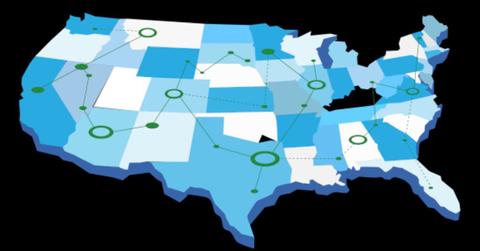 NEWS
NEWSStay Connected: Top 10 US Cities With Great Internet

Oct. 13 2023, Published 1:04 a.m. ET
The sprawling digital landscape of the United States is consistently evolving with the growing demands of our modern lifestyles. Good connectivity to the Internet reigns supreme, leading to a consistent demand for the best ISPs (internet service providers). However, like any other country, the demand and infrastructure for internet connectivity are not equal in all states. This disparity in the infrastructure and demand paints a picture of contrasting fortunes in different cities. This article delves into this fascinating interplay of internet infrastructure and its demand in the top 10 U.S. cities with the best internet connectivity.
The metrics here are sourced from ISP Reports, a website that assesses internet infrastructure and local community demands for every city in the United States. To see your own cities results, you can enter your details into their Internet Providers Near You page.
The vibrant city of San Francisco in California tops the list because of its iconic Golden Gate Bridge and thriving tech industry. This hints at the huge demand for internet connectivity here. With 55% of residents having access to fiber-optic networks and speedy downloads, San Francisco scores an A- for internet connectivity. Keeping up with this score, the demand index stands at 85/100, indicating that 82% of those with fast connections use this service.
New York City deserves a place on the list of Wall Street's financial giants that boast killer internet infrastructures. While 89% of New Yorkers have access to fiber networks and multiple ISPs, the city's connectivity index is around 75/100. This shows that the information superhighway is underutilized despite the city's tech prowess and the demands of its residents.
Next on the list is Austin, Texas, a city that has gradually emerged as a tech hub. The internet infrastructure receives a commendable B+ rating, with % of residents having access to fiber networks and high-speed ISPs. The connectivity demand index stands at 80/100, reflecting how the city's digital potential is still untapped.
The trend of high connectivity infrastructure juxtaposed with lower demand is also evident in cities like Seattle, Denver, and Boston. Each of these cities boasts B or B+–--rated internet connectivity based on advanced fiber networks and accessibility to the best ISPs, but their connectivity indices range from a modest 78 to 82. This further highlights the significant gap between the availability of high-speed internet infrastructure and the number of users embracing it.
Want OK! each day? Sign up here!
Interestingly, the City of Angels, Los Angeles, also offers a similar case study. Despite the glitzy entertainment industry and technological establishments, the city’s connectivity index stands at 80/100. While 77% of residents in Los Angeles can enjoy the perks of B+-rated internet connectivity with fast download speed, only a small section of them truly use it.
Continuing this stark contrast in the U.S. digital landscape, cities like Chicago, Charlotte, and Minneapolis present an intriguing paradox between demand and infrastructure. Despite 89%–92% of the population of these cities having access to high-speed internet, an average connectivity index reflects an astonishing 73/100 for Chicago, 78/100 in Charlotte, and 77/100 in Minneapolis.
To read more about the methodology behind these numbers, please visit ISP Report’s page detailing their Internet Health Assessment.
In this study of 10 U.S. cities with great internet, we have put forward a vivid contrast between these cities’ internet infrastructures and their connectivity indices. Despite having access to this digital treasure, the lack of demand among people is keeping it largely unexplored. A sharp contrast can be drawn with other U.S. cities where the internet infrastructure might not be A-rated but the demand is substantially higher. This digital divide reflects the digital aspirations of some of these otherwise overlooked cities that desperately need better internet infrastructure.

